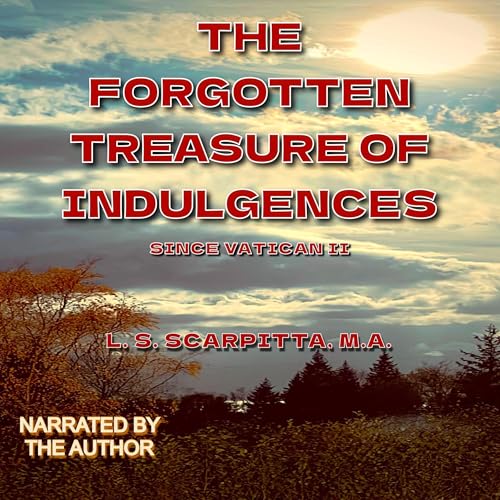
The Forgotten Treasure of Indulgences
Échec de l'ajout au panier.
Échec de l'ajout à la liste d'envies.
Échec de la suppression de la liste d’envies.
Échec du suivi du balado
Ne plus suivre le balado a échoué
0,99 $/mois pendant vos 3 premiers mois
Acheter pour 18,74 $
-
Narrateur(s):
-
L.S. Scarpitta
-
Auteur(s):
-
L.S. Scarpitta
À propos de cet audio
Indulgences are rarely understood and, therefore, ignored by most Catholics today—even by many clergy. Most no longer understand what they are nor do they understand how they can help us, the Poor Souls—and how they can fit into a healthy spiritual life. "Let this book take you into a world of spirituality that has largely been forgotten today."
-----------------------------
In the early 16th century, the doctrine of indulgences became part of the history of the Protestant Reformation. Later that same century, at the Council of Trent (1545 to 1563), changes were made to the process of obtaining indulgences. Those changes eliminated certain past abuses about which Martin Luther had expressed so much concern. Yet, even among many in the Catholic Church today, there remains a reluctance to discuss them at all.
Fast forward to the Second Vatican Council (1962-1965).
Almost immediately upon that Council's completion, more changes were published. However, instead of seeing a renewal of interest in them, in many places indulgences became even less used. Worse, they became even less understood. Eventually they became all but ignored by most Catholics—including by many clergy. Today, most no longer remember what they are, nor how they can help us, the Poor Souls—or how they can fit into a healthy spiritual life. This book provides an overview of what indulgences are—and of their current regulations.
One might wonder how, what seems to have been such an innocuous and beneficial spiritual practice, certainly since Vatican II, could have had so much effect on Martin Luther and the Protestant Reformation—and on the ensuing explosion of countless non-Catholic Christian churches in the world. After all, even Martin Luther had been a Catholic.
©2025 L. S. Scarpitta (P)2025 L. S. Scarpitta

